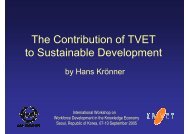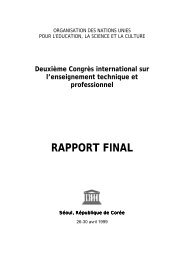Learning for Life, Work and the Future Initial ... - Unesco-Unevoc
Learning for Life, Work and the Future Initial ... - Unesco-Unevoc
Learning for Life, Work and the Future Initial ... - Unesco-Unevoc
You also want an ePaper? Increase the reach of your titles
YUMPU automatically turns print PDFs into web optimized ePapers that Google loves.
<strong>Learning</strong> <strong>for</strong> <strong>Life</strong>, <strong>Work</strong> <strong>and</strong> <strong>the</strong> <strong>Future</strong> Participants’ Papers Page 73<br />
to meet part of <strong>the</strong> cost of training, yet it is pointed out<br />
that many of <strong>the</strong>m are too poor to do so. While it is<br />
true that <strong>the</strong> operators are poor, surveys 3 have indicated<br />
that <strong>the</strong>y are willing <strong>and</strong> able to pay part of <strong>the</strong><br />
training costs if <strong>the</strong>y are convinced that <strong>the</strong> training<br />
will improve <strong>the</strong> per<strong>for</strong>mance of <strong>the</strong>ir business <strong>and</strong> be<br />
translated into higher returns. The most attractive<br />
training programmes <strong>for</strong> entrepreneurs are those<br />
dealing with skills upgrading <strong>and</strong> business management<br />
with a link to credit.<br />
Credit has been used in some programmes as an additional<br />
incentive to attract entrepreneurs <strong>for</strong> training.<br />
This leads to a larger number of participants in training<br />
with credit facilities, but who do not concentrate on <strong>the</strong><br />
training <strong>and</strong> are thus unable to utilise <strong>the</strong> skills given.<br />
4. Donors Active in this Area in <strong>the</strong> Country<br />
Apart from <strong>the</strong> UNDP/NIGP support, OICT has been<br />
able to subsidize <strong>the</strong> cost of training of entrepreneurs<br />
through support from o<strong>the</strong>r donors. The United States<br />
Agency <strong>for</strong> International Development funded a technical<br />
upgrading skills programme which served 442<br />
clients in three administrative regions of Tanzania<br />
(Mwanza, Arusha <strong>and</strong> Dar es Salaam). By linking its<br />
training programmes with credit, <strong>the</strong> African Development<br />
Foundation supported OICT in a training programme<br />
<strong>for</strong> 34 senior managers <strong>and</strong> 14 Board<br />
members of 17 micro-finance institutions on Planning<br />
<strong>and</strong> Management of Sustainable Micro-Enterprise<br />
Credit in 1999.<br />
Through its Commission <strong>for</strong> Civil Servant Re<strong>for</strong>m<br />
(TCSRC), <strong>the</strong> Government of Tanzania supported<br />
training conducted by OICT <strong>for</strong> 44 retrenched workers<br />
in Dar es Salaam. The African Development Fund<br />
supports a government credit project, Self-Entrepreneurs<br />
Loan Facility (SELF), <strong>for</strong> five regions<br />
through <strong>the</strong> Vice-President’s office. Training to build<br />
capacity of <strong>the</strong> micro-finance institutions involved is<br />
one of <strong>the</strong> components of <strong>the</strong> project.<br />
5. Benefits of a Sou<strong>the</strong>rn African Regional<br />
Approach to Training<br />
A subregional approach would allow room <strong>for</strong><br />
improvement in <strong>the</strong> ef<strong>for</strong>t to promote <strong>the</strong> in<strong>for</strong>mal<br />
sector through exchange of experiences within<br />
countries. The use of materials <strong>and</strong> curricula based on<br />
regional cultures would attract more participants due to<br />
<strong>the</strong>ir familiarity. This would also build a stronger<br />
regional integration not only between nations, but also<br />
between individuals, who would learn from each o<strong>the</strong>r.<br />
6. Current Need <strong>for</strong> Improvement<br />
Time, duration <strong>and</strong> place <strong>for</strong> <strong>the</strong> training programmes<br />
must take into consideration <strong>the</strong> types of business of<br />
<strong>the</strong> beneficiaries. Conducting training programmes<br />
during afternoon hours leaves operators free to continue<br />
with business activities in <strong>the</strong> morning, allowing<br />
<strong>for</strong> <strong>the</strong> two activities to run side by side. A preference<br />
<strong>for</strong> afternoon training was also revealed in o<strong>the</strong>r<br />
in<strong>for</strong>mal sector studies conducted by <strong>the</strong> ILO. 4 The<br />
survey also showed that <strong>the</strong> preferred duration of <strong>the</strong><br />
training programme was two to five days a week.<br />
The identification of training needs <strong>and</strong> <strong>the</strong> design of<br />
training programmes must likewise take into consideration<br />
<strong>the</strong> age <strong>and</strong> level of <strong>for</strong>mal education of <strong>the</strong><br />
beneficiaries. The baseline survey of <strong>the</strong> Income-<br />
Generating Skills Development Programme of OICT<br />
indicated that <strong>the</strong> average age of owner-operators was<br />
about 30 years, of employees a little over 20 years, <strong>and</strong><br />
of employers in <strong>the</strong> in<strong>for</strong>mal sector over 40 years.<br />
Hence <strong>the</strong> training programme considered adults with<br />
family responsibilities.<br />
The majority of OICT clients have primary school<br />
education. Out of a total of 136 people covered 5 in <strong>the</strong><br />
nine groups, only five, representing about 3.6%, had<br />
secondary education. It is generally known that <strong>the</strong><br />
in<strong>for</strong>mal sector is a refuge <strong>for</strong> those who do not find<br />
employment in <strong>the</strong> <strong>for</strong>mal sector, <strong>and</strong> that <strong>the</strong>se are<br />
mostly youths who have finished primary education.<br />
The education profile of <strong>the</strong> operators in this survey is<br />
consistent with this phenomenon.<br />
7. Risks of a Sou<strong>the</strong>rn Africa Regional Approach<br />
The medium of instruction in <strong>the</strong> training of <strong>the</strong> in<strong>for</strong>mal<br />
sector is crucial to <strong>the</strong> target group. Most of <strong>the</strong><br />
training manuals are prepared in English <strong>and</strong> have to<br />
be translated to benefit <strong>the</strong> target groups. About 23%<br />
of <strong>the</strong> clients do not underst<strong>and</strong> any English, 44%<br />
underst<strong>and</strong> simple English but cannot speak any, <strong>and</strong><br />
<strong>the</strong> remaining 33% can both underst<strong>and</strong> <strong>and</strong> speak<br />
simple English. The implication of this is that most of<br />
<strong>the</strong> operators would be at a loss if <strong>the</strong> medium of<br />
instruction in <strong>the</strong> training programmes were English.<br />
Translation of <strong>the</strong> manuals by a regional committee is<br />
crucial in order to avoid giving different concepts to<br />
people in different countries <strong>and</strong> regions.<br />
4 Monji R.G. “Skills Acquisition in <strong>the</strong> Training in <strong>the</strong> In<strong>for</strong>mal Sector”<br />
ILO Interdepartmental Project on <strong>the</strong> Urban In<strong>for</strong>mal Sector,<br />
Discussion Paper No. 3, May 1995.<br />
5 OICT Baseline Survey, 1996<br />
3 NIGP, Programme Evaluation Report (1999); OICT, Impact Evaluation<br />
of Enterprise Development Training <strong>for</strong> Civil Service Re<strong>for</strong>m<br />
Programme (1997); OICT, Baseline Survey of In<strong>for</strong>mal Sector<br />
Operators in Dar es Salaam (1996).





